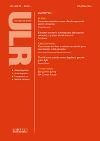Utilities Law Review - Volume 23 - Issue 6

Articles
Sustainable capitalism cannot afford irresponsible parent companies
Charles Demoulin
Chief Investment Officer, Deminor, London
This article reflects on the issue of parent corporations taking advantage of less rigorous legislative and judicial systems in countries in which their subsidiaries operate, therebydisregarding the interests of their stakeholders. Case law from the UK and Canada suggests that this unfairness might be resolved by making parent companies directly liable for harm resulting from their subsidiaries’ misconduct. Parent company liability is already embedded in EU competition law and the proposed directive on corporate sustainability due diligence is an important first step in regulation at European level.
European success in achieving very high capacity networks: a process of trial and error
Tony Shortall
Director, TELAGE
In place of a failing policy for driving VHCN investment based on the mandating of precise access conditions to existing networks, the European Commission has adopted a new policy based on a three-pronged approach. As a result of this policy rethink, it appears that the EU in general is on track to hit its connectivity targets .
Case Comments
Court issues four fines in relation to unlawful price coordination in the gas sector
Martin André Dittmar and Rebecca Fink Joensen
Gorrissen Federspiel, Copenhagen
Two Danish energy companies and two complicit individuals have been fined for unlawful price coordination in the natural gas furnaces market. The judgment of the District Court of Glostrup, handed down on 21 April 2022, shows how such a practice can constitute an infringement of competition law that entails criminal penalties, and also clarifies the nature of penalties that are issued when the infringement is categorised as serious.
The UK’s new subsidy control legislation gets the green light
Edward McNeill
Ashurst, London and Dublin
The UK’s Subsidy Control Act that comes into force in autumn 2022 establishes the framework that is to be applied by public authorities before they decide to grant subsidies. While many of its provisions are based on pre-existing EU State Aid law and WTO subsidies law concepts, the new regime also reflects the UK’s own strategic interests post-Brexit
EU Current Survey
Edited by Peter Alexiadis King’s College, London, and Brussels and Christoph Raab Binder Groesswang, Vienna
Energy – Telecommunications and Digital Economy – Transport .
Malta Report
Paul Edgar Micallef
University of Malta
Illegal streaming of football matches.
UK Current Survey
Edited by Philippa Young Solicitor, Oxford
Broadcasting – Energy – Post – Telecommunications – Transport
